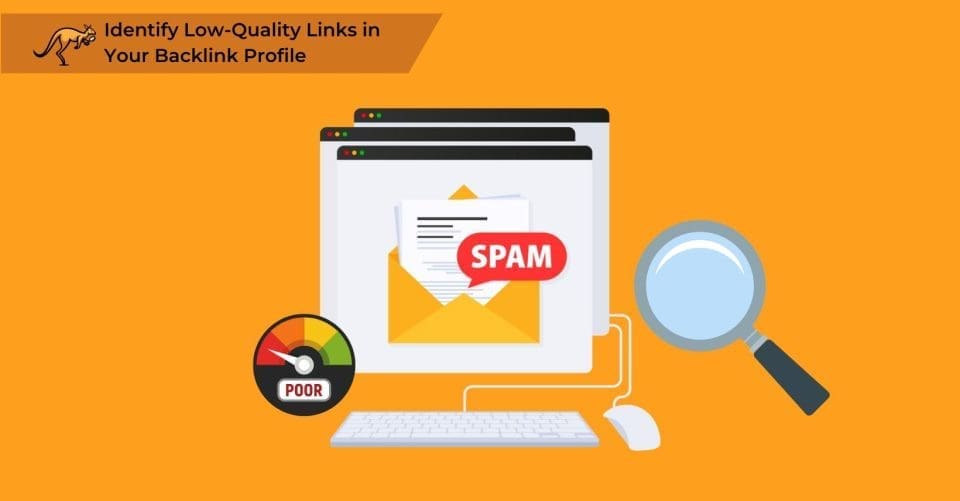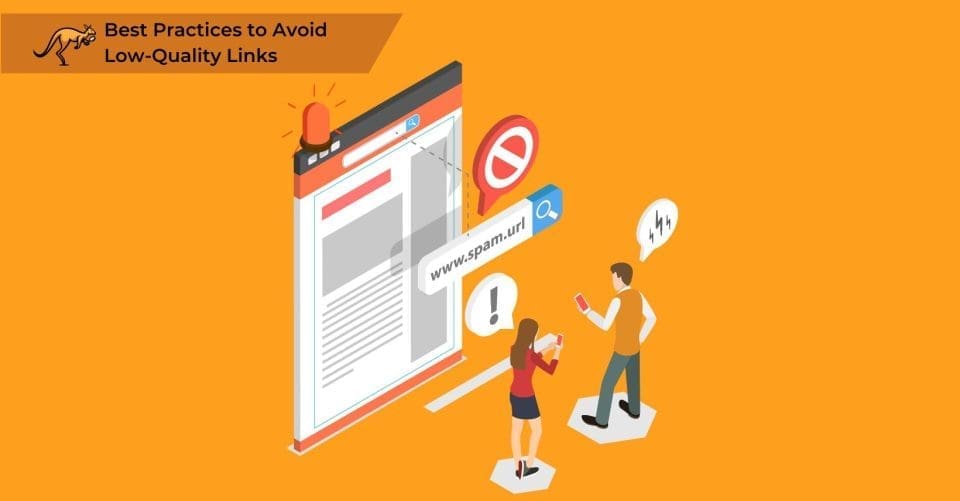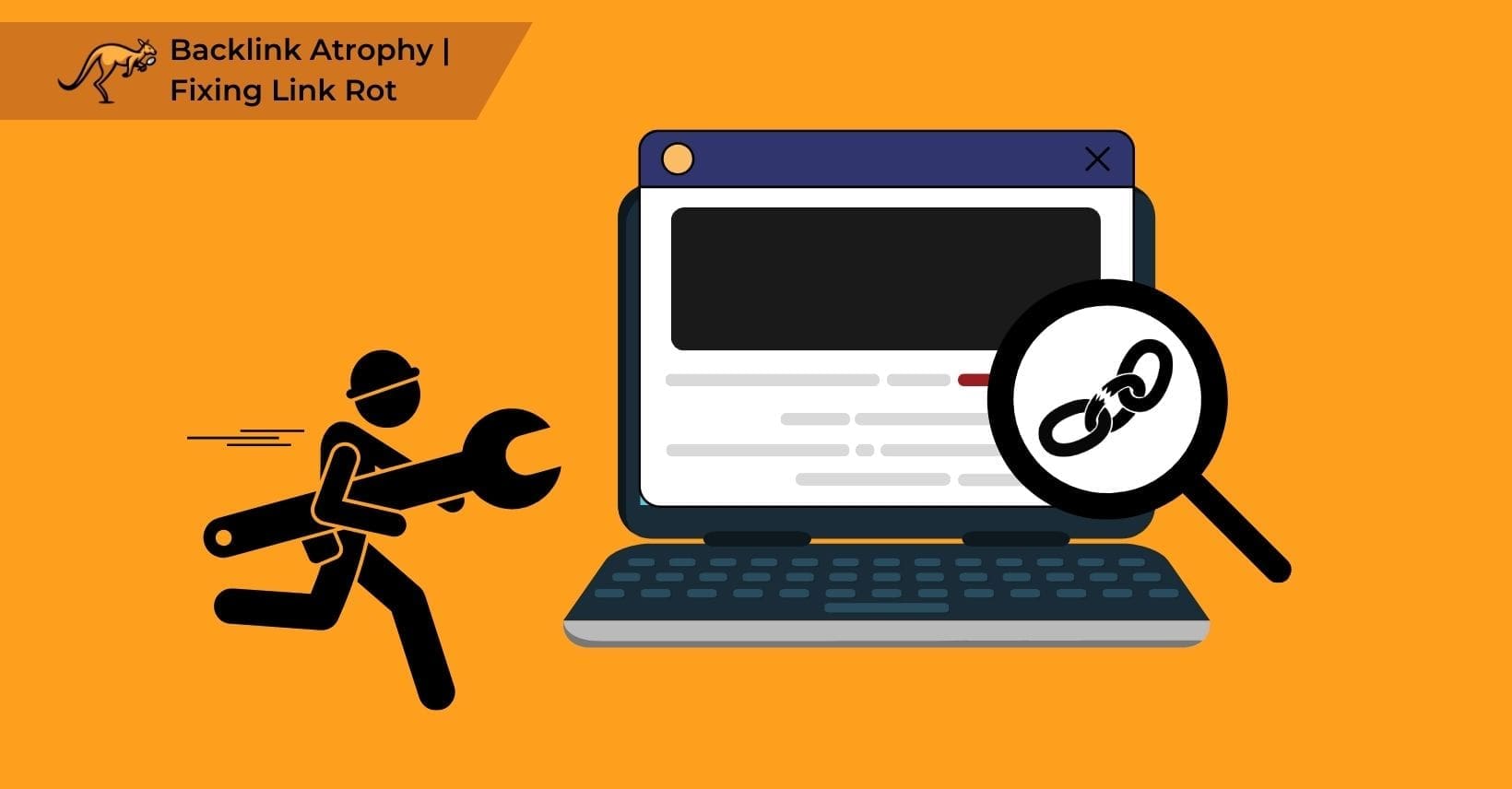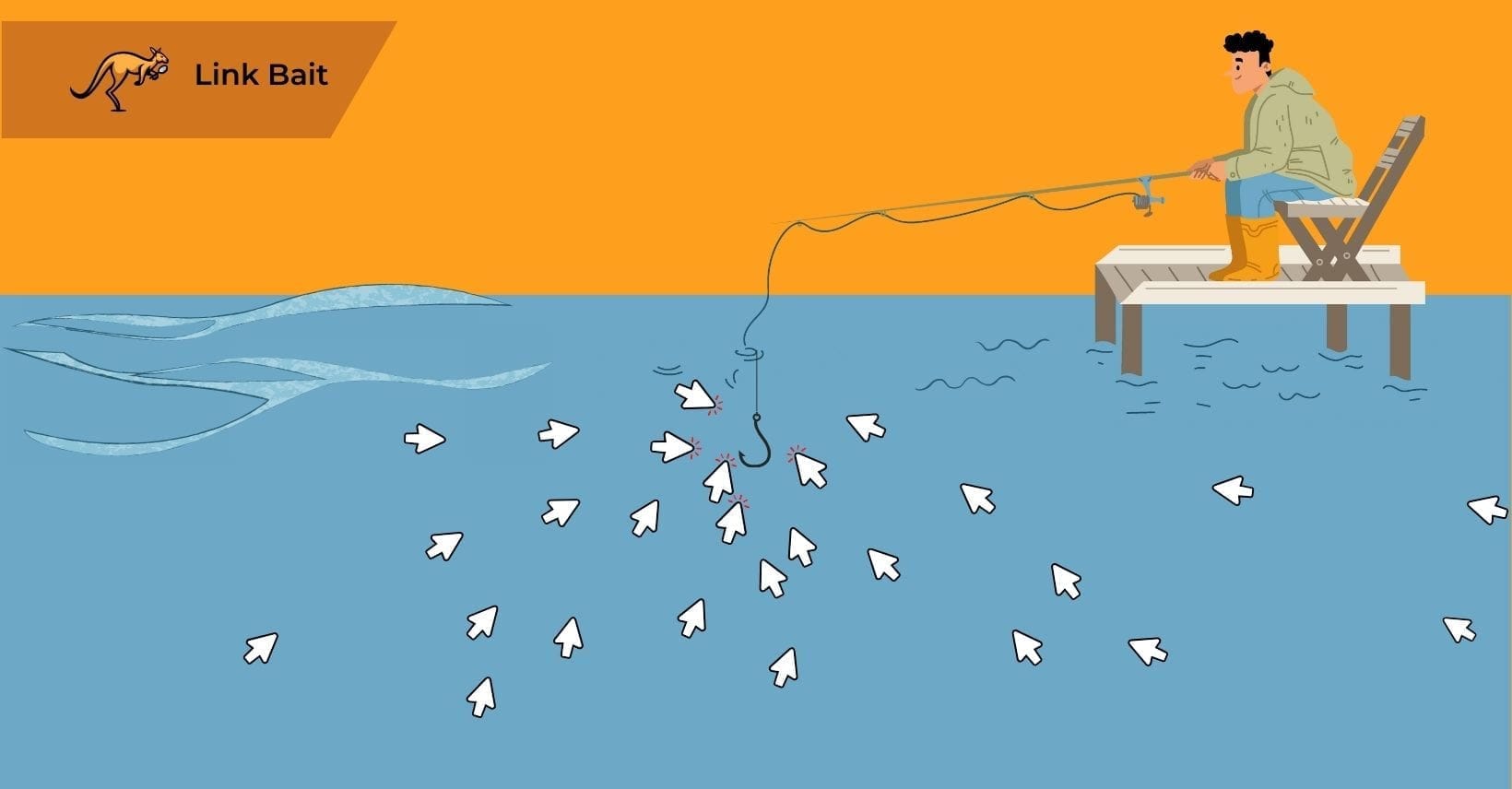Quality consistently outweighs quantity, which holds when evaluating hyperlinks’ impact on your website’s search engine ranking. Not every link contributes positively; indeed, some are downright detrimental.
Low-quality links are backlinks that originate from websites hurriedly prepared with minimal content, such as 300-word blog posts or sparse landing pages with fewer than 100 words, which negatively affect websites by damaging search rankings and diminishing overall SEO performance.
These sources might still feature well-written articles; however, they frequently cover outdated topics or industries and are plagued by excessive pop-up ads and spam-filled comment sections.
Such characteristics define underperforming content and signal a link’s limited value in the eyes of search algorithms. Next, we’ll explore how these less effective links can harm your rankings on search engine results pages (SERP).
Why Do Low-Quality Links Damage Your SERP Rankings?
Low-quality links can undermine your website’s standing on search engine results pages (SERPs), negatively impacting its credibility, authority, and effectiveness of search engine optimization (SEO).
When Google and other search engines encounter these doubtful or irrelevant links leading to your site, search engines interpret low-quality links as an attempt to manipulate rankings, which damages SEO and SERP positions by triggering algorithmic penalties and reducing your website’s perceived authority.
This perception harms your site’s reputation and reliability, diminishing its performance in organic search outcomes. Acquiring high-quality, pertinent links from trusted sources is important to fortify your online presence and enhance your site’s authority and trust.
We’re about to discuss the nature of low-quality links—identifying what marks a link as undesirable and how it can affect your site’s SEO journey.
What Constitutes a Low-Quality Link?
Identifying and managing low-quality links is key to maintaining a strong backlink profile. These problematic links often stem from sites known for subpar content, low domain authority, or spammy behavior.
They can degrade your site’s SEO by linking you to unreliable sources, including link farms, unmoderated directories, or irrelevant websites.
Similarly, such links, especially in large numbers or misplaced contexts, diminish their value and can even harm your website’s credibility.
Links from sources known for malware or phishing are particularly damaging and can result in penalties. Regular audits to spot and remove these harmful links are vital.
Given these risks, it’s worth exploring how low-quality links affect not only SEO but also a website’s overall credibility. Let’s consider their broader impact on digital trust and search engine rankings.
How Do They Impact SEO and Site Credibility?
Low-quality links can severely impact your SEO performance and the perceived reliability of your website. Such links can trigger search engine penalties, erode user trust, and reduce your visibility in organic searches.
If your website is linked to numerous substandard or spammy sources, search engines like Google might assess your site as low in quality and relevance. This can lead to a drop in your search rankings or penalties that push your website further down in search results.
Besides, when users perceive a connection between your website and unreliable sources, they may view your site as less credible and authoritative. This negative image can affect your SEO metrics and your general online reputation.
Moving on, knowing how to sift through your backlink profile to spot these detrimental links is essential. Here’s how to identify which links might damage your site’s reputation.
How Can You Identify Low-Quality Links in Your Backlink Profile?

It’s important to identify and eliminate low-quality backlinks to maintain a strong link profile and achieve favorable SEO results.
Key indicators such as spam scores, low domain ratings, unindexed websites, Low Organic Traffic, a High number of External Links, and Unbalanced Anchor Text can help pinpoint harmful links.
Tools like Ahrefs, SEMrush, and Moz’s Link Explorer enable webmasters to efficiently analyze backlink profiles and identify low-quality links, which helps detect harmful connections through comprehensive metrics including spam scores, domain authority, and indexation status.
High Spam Score
A high spam score associated with a backlink indicates potential risks, such as the link originating from a spammy or malicious website, which can harm your site’s reputation and SEO performance.
When search engines like Google detect backlinks from such websites with a high spam score, they may penalize your site, leading to a drop in search rankings. This penalty can have a cascading effect on your website’s overall traffic and visibility.
It’s important to regularly monitor your backlink profile to identify and disavow toxic links, mitigating the negative impact on your SEO efforts. Inbound links from reputable and authoritative sites play a vital role in establishing your website’s credibility and trustworthiness in search engine’s and users’ eyes.
Low Domain Rating
A linking website’s low domain rating suggests it may need more authority, trustworthiness, or quality content, making it a potential source of low-quality backlinks that could harm your SEO efforts.
Links from websites with low domain authority play a vital role in determining your website’s quality and credibility in search engines’ eyes. Search engines like Google consider backlinks a key factor in ranking websites.
Suppose you have a considerable number of backlinks from low-quality sites. This can positively impact your SEO performance, leading to higher rankings and increased visibility.
These low-quality backlinks can also increase the risk of penalizing your website by search engines for manipulative link-building practices. Building a strong backlink profile from high-authority websites is essential for improving your organic search rankings and driving more organic traffic.
Unindexed Website
Backlinks from unindexed websites, which are not included in search engine databases, may not contribute positively to your SEO efforts and could be indicators of low-quality link sources.
Unindexed websites are considered sources of low-quality links because search engines have determined these sites lack sufficient credibility, relevance, or quality to include in their databases, which means backlinks from unindexed sources pose significant risks to your backlink profile’s health and search performance.
Quality backlinks from reputable and indexed websites boost your site’s authority and rankings. Therefore, it’s essential to cultivate a various portfolio of high-quality backlinks from authoritative domains to strengthen your SEO strategy and avoid any association with questionable link sources.
Low Organic Traffic
Backlinks from websites with consistently low organic traffic levels may signal a need for more audience engagement and relevance, making them potential candidates for low-quality links that could affect your site’s SEO performance.
When your website obtains backlinks from sites that are not attracting a significant number of visitors, it could indicate that those sites need more credibility or authority, diminishing the backlink’s value.
Quality backlinks originate from reputable sources with strong traffic and engagement levels. These links enhance your site’s credibility and improve its search engine ranking.
Therefore, acquiring backlinks from websites that resonate with your target audience and offer valuable content is important for improving your SEO strategy.
High number of External Links
Backlinks from pages with an excessively high external link may dilute their SEO value and authority, potentially categorizing them as low-quality links that could impact your site’s search rankings.
It is important to understand that search engines analyze the quantity and quality of backlinks.
Websites with high numbers of external links are considered low-quality link sources because each outbound link dilutes the page’s authority distribution, which means your backlink receives only a minimal fraction of the already questionable value, often indicating link schemes or poor editorial standards. The relevance and authority of the linking domain play an important role in determining the impact of a backlink. Sites with high authority and topical relevance to your content can substantially boost your SEO efforts.
Unbalanced Anchor Text
Backlinks with unbalanced anchor text distribution, such as keyword stuffing or irrelevant text, can raise red flags to search engines, potentially leading to penalties or devaluation of those links in your backlink profile.
A well-rounded anchor text profile is important for maintaining a healthy link profile and securing long-term SEO success. Unbalanced anchor text distribution indicates low-quality links because search engines analyze backlink profiles for natural diversity in anchor text, which demonstrates organic linking practices rather than manipulative SEO tactics that often feature keyword-stuffed or unnaturally consistent anchor texts.
Overusing a single keyword or overly generic phrases can signal manipulation to search engines, triggering suspicion. In contrast, wide anchor texts that include branded terms, exact match keywords, and varied phrases enhance the credibility of your backlinks and signal relevance to search engines.
Adopting a mix of anchor texts from trusted sources ensures your SEO efforts are resilient to changes in search engine algorithms that penalize questionable link practices.
Producing content that naturally attracts these quality links enhances your site’s credibility and boosts its ranking in search results. Transitioning from this strategy, it’s important to consider the best practices for avoiding low-quality links, which safeguard your site’s integrity and contribute to its online success.
What Are the Best Practices to Avoid Low-Quality Links?

To maintain the integrity of a site’s SEO, it’s vital to filter out poor-quality links, with a keen focus on building a strong backlink profile.
Tools for evaluating links and detailed analysis empower web admins to separate valuable connections from detrimental ones.
Embracing strategies like guest blogging on well-regarded platforms, partnering with influencers, and composing content that organically draws links is pivotal in enriching your backlink array.
Keeping a vigilant eye on your backlink portfolio and quickly distancing your site from harmful or unrelated links is fundamental for preserving link quality.
Regular audits of your link profile through platforms such as Moz, Ahrefs, or SEMrush reveal the state of your backlinks and highlight any that may degrade your site’s reputation.
As we discuss effective tools and methods for scrutinizing potential link sources, you must equip yourself with knowledge and strategies for continuous link quality monitoring.
Carefully Examine Potential Link Sources Effectively
Thoroughly scrutinizing potential link sources is a critical step in avoiding low-quality links. You can mitigate the risks associated with harmful backlinks by conducting comprehensive evaluations of websites, content relevance, and linking practices.
When evaluating link sources, one essential criterion is the website’s domain authority and overall reputation. High-quality sites with credible content are more trustworthy link partners. Examining the context in which the link is placed can provide insights into its relevance and potential impact on your website’s SEO performance.
Implementing a systematic risk assessment strategy involves assessing the various link types, anchor text variations, and the overall link profile to secure a healthy and natural backlink profile. This proactive approach helps identify and disavow any suspicious or harmful links promptly, safeguarding your website from penalties.
Essential Tools for Monitoring Link Quality
Leveraging essential tools for monitoring link quality can streamline identifying and managing low-quality links. Tools like Moz, Ahrefs, and Google Search Console offer valuable insights into backlink profiles and help optimize link-building strategies.
These monitoring tools provide a comprehensive analysis of backlinks and enable users to track the authority and relevance of inbound links. By evaluating factors such as domain authority, anchor text variety, and link status, website owners can make informed decisions to enhance their overall link portfolio.
Incorporating precise keywords and recognizing entities enhances the understanding of how backlinks can boost SEO. By analyzing these connections, we can pinpoint and mitigate links that could damage a website’s online credibility and visibility. Following this topic, we consider whether engaging a professional to develop high-quality links could be a prudent next step.
Should You Hire a Professional to Develop High-Quality Links?
Hiring a professional link building service is akin to making a smart investment in securing premium-quality links that boost your site’s SEO health. These specialists bring expertise and a vast resource pool to deploy strategies that resonate with your website’s requirements.
Entrusting your link-building efforts to these experts means tapping into their profound understanding of the latest SEO trends and algorithms, which will place your website ahead in the competitive arena.
Their customized approach guarantees that each link added is pertinent and enriches your site’s authority. Opting for professional link building services saves precious time and effort and offers a guarantee of quality vital in the dynamic online world.
Thanks to their wide network, these professionals can obtain backlinks from esteemed sites, elevating your site’s trustworthiness and online presence.
As we transition into discussing the unparalleled benefits of choosing Searcharoo for your link building needs, it’s essential to note their commitment to enhancing your website’s authority and visibility through strategic link acquisition.
Why Is Searcharoo the Best Choice for Managing Your Link Building?
Opting for Searcharoo for your link-building activities can greatly enhance your SEO efforts and boost your website’s online presence. Renowned for delivering top-tier links, Searcharoo excels as a dependable ally in link development.
Their deep understanding of SEO dynamics enables them to create strategies that adapt to search engines’ shifting preferences.
Searcharoo consistently secures valuable links that elevate organic traffic and improve search engine rankings using cutting-edge techniques and a proactive approach to industry trends.
Their dedication to quality and detailed approach guarantees that each link contributes positively to your site’s performance.
With such a strong focus on acquiring high-quality links, it’s also wise to consider the flip side: removing harmful links. Stay tuned as we explore strategies for eliminating low-quality links that could hold your site back.
How Can You Get Rid of Low-Quality Links?
Ensuring your website’s SEO remains intact involves a critical step: purging detrimental links from your backlink profile. By executing a disavow process, you communicate directly with search engines, demonstrating a commitment to a pristine link environment.
The disavow process entails webmasters pinpointing negative links, documenting them in a text file, and submitting a disavow request via Google Search Console, which tells search engines to ignore these harmful connections while maintaining continuous surveillance for new unwelcome backlinks.
Additionally, contacting web admins to request the deletion of these low-quality links can further purify your site’s backlink profile, fostering its SEO vitality.
As we transition to concluding reflections, it’s worth considering the broader implications of maintaining a clean backlink profile for your site’s search engine standing and the proactive measures required to achieve this.
Enhancing Your SEO: Final Reflections on Effective Link Management
Managing low-quality links is a critical aspect of maintaining a healthy backlink profile and sustaining your site’s SEO performance. By implementing proactive strategies, monitoring tools, and expert assistance, you can safeguard your website from the negative impacts of such links and enhance your online visibility.
One of the key considerations in handling low-quality links is to conduct regular audits of your backlink profile to identify and remove any harmful links that could be dragging down your SEO efforts. Expert guidance becomes invaluable in this process, as experienced professionals can provide insights into best practices and industry trends for link management.
Continuous monitoring is essential to ensure that new low-quality links are promptly addressed. Utilizing tools like Google Search Console and third-party services can help you stay on top of your backlink health and take proactive steps to maintain a clean link profile.





